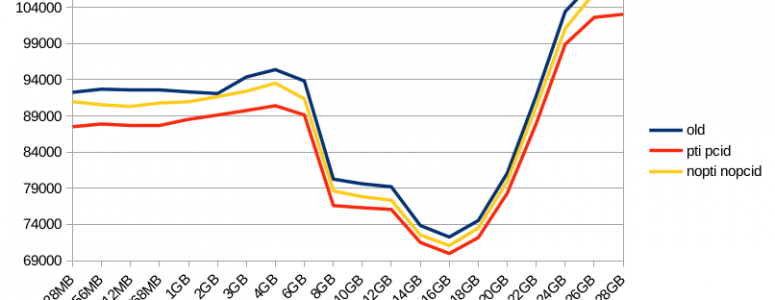PostgreSQL configuration changes:
bgwriter_delay = 10ms bgwriter_lru_maxpages = 1000 bgwriter_lru_multiplier = 10.0 checkpoint_timeout = 1h max_wal_size = 8GB min_wal_size = 2GB checkpoint_completion_target = 0.9 log_destination = stderr logging_collector = on log_directory = /var/log/postgresql log_filename = postgresql-%a.log log_truncate_on_rotation = on log_rotation_age = 1d log_rotation_size = 0 log_checkpoints = on log_line_prefix = ‘%m %p %u@%d from %h [vxid:%v txid:%x] [%i] ’ log_lock_waits = on log_temp_files = 0
Test details
Test database has been prepared with: pgbench -i -s 1700 pgbench
Database size: 26 035 MB
The following kernels and options had been tested
- Old kernel version: 3.10.0-514.el7.x86_64
- New kernel version, as-is: 3.10.0-693.11.6.el7.x86_64-pti-pcid
- New kernel, with nopcid: 3.10.0-693.11.6.el7.x86_64-pti-nopcid
- New kernel, with nopti: 3.10.0-693.11.6.el7.x86_64-nopti-pcid
- New kernel, with nopti nopcid: 3.10.0-693.11.6.el7.x86_64-nopti-nopcid
For each of the 5 “kernels”, 3 variants of shared buffers have been observed: 1GB, 8GB and 28GB.
After each restart of the cluster, tables and indexes have been pre-warmed via `pg_prewarm` module. Then, 15-minute long read-only pgbench run has been conducted.
Script of the test:
echo «shared_buffers=${SB}» > /var/lib/pgsql/10/data/postgresql.auto.conf
pg_ctl -D ~/10/data -m fast restart
echo «SELECT format(‘SELECT %L, pg_prewarm(%L);’, relname, relname) FROM pg_class c JOIN pg_namespace n ON n.oid=c.relnamespace AND n.nspname=’public’ WHERE relkind IN (‘r’,’i’)gexec» |psql -qAtX pgbench
pgbench -T 900 -j4 -M prepared -c 12 -Sr pgbench
Results
|
Alias
|
TPS (1GB)
|
TPS (8GB)
|
TPS (28GB)
|
|
old
|
92995
|
80554
|
107144
|
|
pti pcid
|
88394 (-4.9%)
|
77586 (-3.7%)
|
102839 (-4.0%)
|
|
pti nopcid
|
83216 (-10.5%)
|
74947 (-7.0%)
|
98653 (-7.9%)
|
|
nopti pcid
|
90772 (-2.4%)
|
79120 (-1.8%)
|
105726 (-1.3%)
|
|
nopti nopcid
|
91387 (-1.7%)
|
78856 (-2.1%)
|
105593 (-1.4%)
|
Test shows, that new PTI-enabled kernel brings ~4-5% slowdown for in-memory read-only operations. Using new kernel parameters nopti and nopcid (together) it is possible to disable new functionality, however, small performance reduction is still observed.
There are no general directions on whether to disable PTI, after all, its goal is to close HW-based bug. In cases, when server is dedicated to the database alone and it is a physical machine (not VM or container), it seems fine to use nopti parameter and get a better performance.
Here’s a graph, that shows TPS for the old kernel, new (PTI-enabled) one and new kernel with PTI and PCID features disabled:
For the chosen test case performance penalty is not huge. And one can clearly see, why using 50% of RAM for shared buffers is not recommended 😉
Also, since larger shared buffers yield more TPS and can significantly reduce IO volume (due to only checkpoints are writing dirty blocks) it seems beneficial to use 70-80% of RAM for this purpose. This requires more tuning on the kernel level, though — HugePages are a must for such setups.








